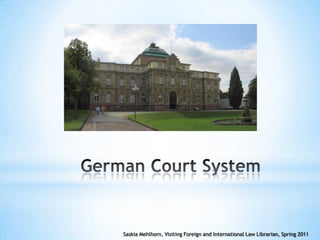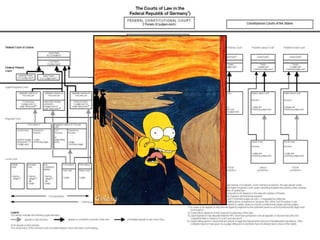German courtsystem
- 1. German Court SystemSaskia Mehlhorn, Visiting Foreign and International Law Librarian, Spring 2011
- 2. Overview
- 7. Civil LawDetermines the relationships among persons and/or legal entities.
- 8. Criminal LawCriminal activities by anyone over the age of 18.
- 9. Amtsgericht
- 10. Landgericht
- 16. Access to the court system
- 17. Fees are regulated by federal lawIf not able to pay possibility of legal aid
Editor's Notes
- One by one â starting with constitutional jurisdiction
- Federal Constitutional Court (Karlsruhe) http://www.bundesverfassungsgericht.de/en/update.htmlDecides on Constitutional issuesThe Federal Constitutional Court has far reaching competence. As an institution it stands at the same level at the Bundestag, Bundesrat and the government and as a judicial body it ranks amongst all courts. While the appeals courts can refer a case to the Federal Constitutional Court, the Court is generally called upon through other measures. These measures are: The federal government, a state government (or a group of them) or a political initiative requests the Court to evaluate the constitutionality of a norm (AbstrakteNormenkontrolle)An appeals court refers a matter to the Court if they are not assured of the constitutionality of the norm/statute they have to base their decision on (KonkreteNomenkontrolle) Anyone who believes that he/she was treated unconstitutional has the right to bring a case to the Court (Verfassungsbeschwerde)Statistics: http://www.bundesverfassungsgericht.de/organisation/gb2010/A-I-4.html
- Apart from the constitutionaljurisdiction the German judicature is divided into two general sections, ordinary and special jurisdiction, and these sections separately determine which courts have to be engaged. The ordinary jurisdiction comprises of matters in civil and criminal law (if time - go into further detail the so called voluntary jurisdiction would have to be introduced at this point).
- Civil law is also referred to as private law and regulates the relations between two private entities for example consumer-merchant, tenant-landlord, employee-employer. As far as jurisdiction is concerned, it is not clear cut as some of these relations are regulate in specialized statues and will be iudicated by special courts.
- This includes criminal activities in connection with the environment andinternet. Between the age of 14 and 18 a special youth court steps in. Possible extension up to the age of 21 â discuss.
- District Court (Inside the Amtsgericht Berlin Mitte) âThe main areas of an Amtsgericht's jurisdiction are:* court of first instance for civil case where the subject of litigation is worth 5,000 Euros or less, and for litigation involving rental agreements, marriages, alimony and child custody.* court of first instance for criminal cases where a fine or a prison term of no more than four years can be imposed.* administration of several public register such as the companies', non-profit amd full-profitassociations', the cooperatives' and the land ownership register.
- Regional or County Court (in Munich including BJM, OLG and LG)In civil matters:Anything over 5000 Euro if not delegated to the AmtsgerichtStaatshaftungsansprueche (Liability of the state â when is this relevant, looking at environmental issues, bauhaftung etc.)Matters regulated by commercial statutesAppellate court for district court â review of facts and lawIn criminal matters: * Court of first instance for some felonies and special less serious crimes. *Specially constituted Strafkammer for minor political crimes. * An exhaustive list of serious felonies such as murder.
- In most states Higher Regional Court or County Court of AppealCriminal: Serious political offenses like treasonCivil: Family law goes directly from AG to OLGAppeal for error of law from certain decisions of Amtsrichter as well as appellate decisions of kleine and groÃeStrafkammer.
- Federal Court of Justice or Federal Supreme Court (in Karlsruhe) http://www.bundesgerichtshof.de/DE/Home/home_node.htmlHighest Court for Civil and Criminal issues <- OLG <- LG <- AGAppeal for error of law from trial decisions of the groÃeStrafkammer, Schwurgericht and Oberlandesgericht.
- Also called subject area jurisdiction - Specialized courts deal with five distinct subject areas: labor,administrative, fiscal, patent and social law. Like the ordinary courts, they are organized hierarchically with the Land court systems under a federal appeals court. Labor courts also function on three levels and address disputes over collective bargaining agreements and working conditions. Administrative courts consist of local administrative courts, higher administrative courts, and the Federal Administrative Court. In these courts, individuals can seek compensation from the government for any harm caused by incorrect administrative actions by officials or even have administrative acts overturned. For instance, many lawsuits have been brought in administrative courts by citizens against the government concerning the location and safety standards of nuclear power plants.Finance, or fiscal, courts hear only tax-related cases and exist on two levels. Social courts, organized at three levels, adjudicate cases relating to the system of social insurance, which includes unemployment compensation, workersâ compensation and social security payments. Finally, a single Federal Patents Court in Munich adjudicates disputes relating to industrial property rights.
- Federal courts:Labor: http://www.bundesarbeitsgericht.de/Administrative: http://www.bverwg.de/enid/b62af0c007378cd6c0bbf638f71f1ce4,51519f6d6f6465092d09/BESONDERE_SEITEN/Startseite_2.htmlFiscal: http://www.bundesfinanzhof.de/Social Security: http://www.bsg.bund.de/cln_108/DE/Home/homepage__node.html?__nnn=truePatent: http://www.bpatg.de/
- Judges are not elected but selected Federal employeesIndependent BUT decisions by higher courts have to be acknowledge (discuss)
- Prozesskostenhilfeâ Civil law only, discuss how the selection is made; what happens in criminal matters; how are fees set and how are they determined after the decision.


















